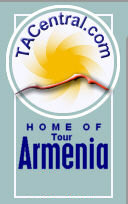Historically, Greeks and Greek culture permeated the Armenian highland from the iron age, when Strabo recorded the march of the 10,000 through the Armenian heartland and Alexander marched along the southern frontiers.
The Greeks in Armenia are called Pontic Greeks. Pontus means "sea" in Greek and is located in the south-eastern littoral of the Black Sea. Its connection with Hellenism stretches back to pre-historic times to the legends of Jason and the Argonauts quest for the Golden Fleece and to Heracles obtaining the Amazon Queen's girdle.
The coastal region was colonized by the Ionians, especially the city of Miletus which founded Sinope (785 BC), Trapezunta (756 BC) and the numerous other cities along the coast from Heracleia to Discurias in the Caucasus. The Hinterland was gradually Hellenized and this was completed after Alexander's conquests.
Its contribution to Hellenism in those 2800 years has been enormous: Diogenes hailed from Sinope and Strabo from Amaseia, it was here that Xenophon found a safe haven, that the great Comneni dynasty reigned, the home of Cardinal Bessarion and the Hypsilandis family; it was also the last Greek territory to fall to the Turks (in 1461). Many famous churches, monasteries and schools are a testament to the resilience of Hellenism. The Pontians are a distinct Greek people with their own dialect, dances, songs and theatre.
Intermingling and influencing each other, both ancestral Greeks and Armenians shaped Anatolia and the Near East immeasurably.
The Greek community in Armenia dates back to the Greek War of Independence, when Greeks living in Anatolia were persecuted by Ottomans. The persecutions became mass slaughter during the Russo-Turkish-Persian War of 1827-1828, and large communities immigrated to Eastern Armenia in its wake. Further immigration continued during the Armenian, and then the Greek, genocides of 1915-1921.
Greeks share a common tragedy (their genocides) and a common enemy (Turkey), which forged close ties in the ensuing century. In fact, the Greek genocide is often lock-step with the Armenian holocaust, both singled out for extermination for being Christians.
The turning point in the treatment of Greeks in Turkey was the alliance between Germany and the Sultan that commenced after the Treaty of Berlin 1878. Germany regarded Anglo French protection of Christians as an obstacle to its interests and convinced the Turkish authorities that the Greeks were working for the collapse of the Ottoman Empire.
The successful national movements in the Balkans posed a threat that the same would occur in Asia Minor. After the Balkan Wars the Young Turks decided that Asia Minor would be a homeland for Turks alone and that the Greeks and Armenians had to be eliminated. The outbreak of World War I made this possible and Germany willingly sacrificed the Christian minorities to achieve its aim in the Middle East. However, it is the German and Austrian diplomats reports that confirm that what took place was a systematic and deliberate extermination of the Christian population.
By government decree 1,500,000 Armenians and 300,000 Pontic Greeks were annihilated through exile, starvation, cold, illness, slaughter, murder, gallows, axe, and fire. Those who survived fled never to return. The Pontians now lie scattered all over the world, about 5,000 in Armenia. As a result of the genocide and their unique history, language (the dialect is a valuable link between ancient and modern Greek), and culture are endangered and face extinction.
Now
With the glaring exception of the Greek Telecom OTE destruction of the Armenian telephone system, Greeks and Armenians continue to share positive relations and a common goal of forcing Turkey to admit to its genocidal history. Despite this, Greeks who remained in Armenia during the Soviet times have faced the same emigration as native Armenians, searching for a living and a better life elsewhere.
Greeks living in Armenia speak Ponti, or Old Greek, which was the language used by Homer and Plato. Settling in rural villages and mining towns, Greeks found tolerance in Armenia, where they built their own schools and spoke their language along with Armenian and Russian.
Many of the young have immigrated back to Greece since the collapse of the Soviet Union, where they find work, but also feel ostracized in a society that speaks modern Greek.
The main areas of Greek residence in Armenia are the canyon of Alaverdi and the Lori Highland, as well as Yerevan, the capital, the cities Noyemberian and Giumri. Greek communities can be found at Hankavan, Alaverdi and Arzni.
For more see our "Greek Armenia: Hankavan Village."




